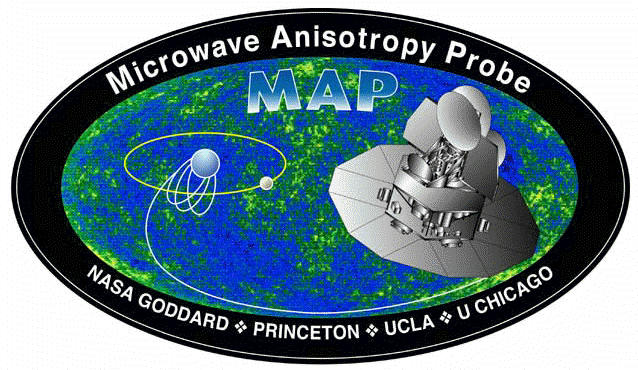|
|
|
|
|
|
|
News & Views item - June 2006 |
Riddle
Me This: If nothing can travel faster than the speed of light, then
how can the universe have expanded by "inflation" to billions of light years
across in the first tiny fraction of a second? (June 12, 2006)
 The answer to that question and
a number of other ones on cosmology can be found at
map.gsfc.nasa.gov/m_uni.html It's part of NASA's WMAP website,
map.gsfc.nasa.gov/index.html, where
WMAP = Wilkinson Microwave Anisotropy Probe.
The answer to that question and
a number of other ones on cosmology can be found at
map.gsfc.nasa.gov/m_uni.html It's part of NASA's WMAP website,
map.gsfc.nasa.gov/index.html, where
WMAP = Wilkinson Microwave Anisotropy Probe.
So, FAQ 10:
If nothing can travel faster than the speed of light, then how can the universe have expanded by "inflation" to billions of light years across in the first tiny fraction of a second?
A: General relativity does require that no object can move through space faster than the speed of light.
General relativity also predicts that space itself can expand. Since Edwin Hubble's work in the 1920's, astronomers know that space is expanding: the larger the distance between galaxies, the faster they move away from each other. We can actually point to distant galaxies (on opposite sides of the sky) that are moving apart from each other at faster than the speed of light.
If space was filled only with matter, then the expansion of space would slow with time. One of the great surprises in modern cosmology is the observation that the expansion of space is accelerating with time. This implies that galaxies are moving away from each other at ever increasing speed.
The key idea behind inflationary theory is the notion that the universe underwent a period of accelerated expansion during the first 10-34 seconds (0.0000000000000000000000000000000006 seconds). During this inflationary period, the universe doubled in size at least 90 times.
Is it possible to travel at warp speed? Intriguingly, there are solutions to general relativity where you can warp space around you and have space move quickly towards other objects while you "surf" the rapidly moving piece of space. However, recent studies suggest that these warp solutions are not physically realizable.